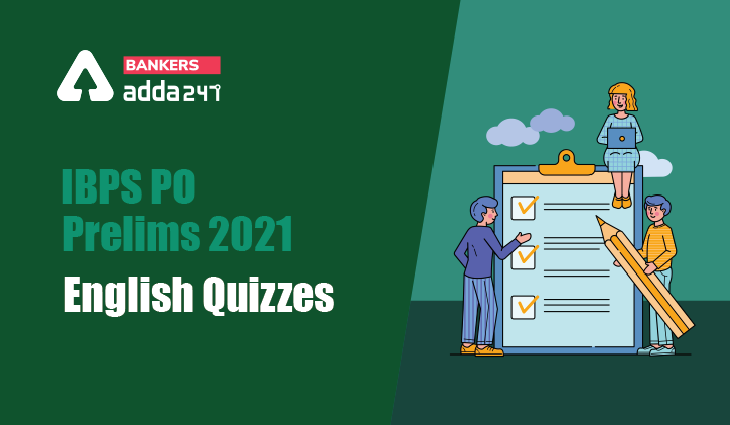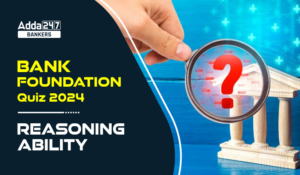Directions (1-5): In each of the following questions given below there are two blanks, each blank indicates that something has been omitted. Choose the set of words for each blank which best fits to the meaning of the sentence as a whole.
Q1. SEBI’s predominant concern, apart from ____________ the information available to investors, seems to be to ____________ rating agencies from resorting to collusion in reaching decisions.
(a) regulating, delaying
(b) overhauling, circumventing
(c) magnifying, deter
(d) improving, prevent
(e) retrogressing, retard
Q2. Repeated failures have not ______________ the business of rating agencies, primarily due to the lack of alternative service providers who can _______________ out investors.
(a) concerned, serve
(b) assumed, gratify
(c) pretended, favour
(d) affected, help
(e) perturbed, pamper
Q3. The legislature of Spain’s north-eastern region last week passed a law to back the October 1 vote for ___________, consistent with the narrow electoral mandate it ____________ on a promise of self-determination.
(a) rejection, disbursed
(b) secession, received
(c) repudiation, credited
(d) abrogation, sanctioned
(e) evasion, recognized
Q4. Global commodities have ___________ a bull run over the last 12 months, ____________hopes of the beginning of the next supercycle in commodity prices.
(a) insisted, provoking
(b) professed, agitating
(c) witnessed, reviving
(d) noticed, dissuading
(e) understood, rectifying
Q5. After 39 __________ successful launches, the Indian Space Research Organisation had almost made it ______________ that launching satellites was indeed child’s play when it used its workhorse rocket, the Polar Satellite Launch Vehicle.
(a) pertinent, perform
(b) infrequent, operate
(c) recurrent, exert
(d) coherent, conduct
(e) consecutive, appear
Directions (6-10): Read each sentence to find out whether there is any grammatical or idiomatic error in it. The error, if any, will be in one part of the sentence. The number of that part is the answer. If there is ‘No error’, the answer is (e). (Ignore errors of punctuation, if any.)
Q6. Why we do not (a)/ meet to discuss (b)/ this matter in detail (c)/ on next Friday? (d)/ No error. (e)
Q7. Had the opportunity (a)/ been given to him (b)/ he will have (c)/ proved successful (d). / No Error. (e)
Q8. Jamuna takes delight (a)/with music and (b)/hopes to become (c)/a successful musician. (d)/No error. (e)
Q9. In spite of toiling (a)/ very hardly he (b)/ realized that he had (c)/ not earned anything substantial. (d)/ No error. (e)
Q10. You should inform (a)/ your superiors about (b)/ all those events which are (c)/ directly related to your work. (d)/ No error. (e)
Directions (11-15): Rearrange the following sentences (A), (B), (C), (D), (E), (F) in the proper sequence to form a meaningful paragraph; then answer the questions given below them.
(A) This needs to be reversed.
(B) Data is available only for gross domestic capital formation and only up to 2015-16.
(C) Declining investment is a major problem that has been evident for some years.
(D) Drilling deeper to look at investment by sub-sectors (public, private and households, which includes the informal sector) reveals an interesting picture.
(E) While public investment increased from 7.1% of GDP in 2013-14 to 7.5% in 2015-16, this was more than offset by a decline in private capital formation.
(F) Gross fixed capital formation in current prices fell from 31.3% of gross domestic product (GDP) in 2013-14 to 27.1% in 2016-17.
Q11. Which of the following should be the first sentence after rearrangement?
(a) B
(b) F
(c) A
(d) E
(e) C
Q12. Which of the following should be the third sentence after rearrangement?
(a) A
(b) D
(c) B
(d) E
(e) C
Q13. Which of the following should be the fifth sentence after rearrangement?
(a) B
(b) F
(c) A
(d) C
(e) E
Q14. Which of the following should be the last sentence after rearrangement?
(a) D
(b) E
(c) A
(d) B
(e) C
Q15. Which of the following should be the second sentence after rearrangement?
(a) C
(b) A
(c) B
(d) F
(e) E
Solutions
S1. Ans. (d)
Sol. “improving, prevent” is the correct set of words that makes the sentence meaningful.
Overhauling means take apart (a piece of machinery or equipment) in order to examine it and repair it if necessary.
Circumventing means avoid.
Retrogressing means go back to an earlier state.
Deter means go back to an earlier state.
S2. Ans. (d)
Sol. “affected, help” is the correct set of words that makes the sentence meaningful.
Perturbed means anxious.
Pamper means indulge with every attention, comfort, and kindness
S3. Ans. (b)
Sol. “secession, received” is the correct set of words that makes the sentence meaningful.
Secession means the action of withdrawing formally from membership of a federation or body, especially a political state.
Repudiation means rejection of a proposal or idea.
Disbursed means pay out (money from a fund).
S4. Ans. (c)
Sol. “witnessed, reviving” is the correct set of words that makes the sentence meaningful.
Dissuading means persuade (someone) not to take a particular course of action.
Professed means of a quality, feeling, or belief) claimed openly but often falsely.
S5. Ans. (e)
Sol. “consecutive, appear” is the correct set of words that makes the sentence meaningful.
Pertinent means relevant or applicable to a particular matter, apposite.
Coherent means logical and consistent.
S6. Ans. (a)
Sol. ‘Why do we not’ will come in place of ‘why we do not’ as the sentence is in interrogative form.
S7. Ans. (c)
Sol. In place of ‘he will have’, ‘he would have been’ will be used.
With Had+ subject + been + V3, Subject + would + have + been + V3 is used.
Ex. Had he been taken to hospital, he would have been saved.
S8. Ans. (b)
Sol. Replace ‘with’ by ‘in’ as “take delight in something” is the correct usage.
e.g. She takes delight in dancing.
S9. Ans. (b)
Sol. ‘hard’ will be used in place of ‘hardly’ as ‘hardly’ is used to depict ‘rarely’ or ‘scarcely’ whereas here ‘hard’ means ‘tough’.
S10. Ans. (e)
Sol. The sentence is grammatically correct.
S11. Ans. (e)
Sol. The sequence of the sentences after rearrangement is CFADBE.
S12. Ans. (a)
Sol. The sequence of the sentences after rearrangement is CFADBE.
S13. Ans. (a)
Sol. The sequence of the sentences after rearrangement is CFADBE.
S14. Ans. (b)
Sol. The sequence of the sentences after rearrangement is CFADBE.
S15. Ans. (d)
Sol. The sequence of the sentences after rearrangement is CFADBE.
Click Here to Register for Bank Exams 2021 Preparation Material





 General Awareness Quiz for Bank Mains Ex...
General Awareness Quiz for Bank Mains Ex...
 English Language Quiz For Bank Foundatio...
English Language Quiz For Bank Foundatio...
 Reasoning Quiz For Bank Foundation 2024 ...
Reasoning Quiz For Bank Foundation 2024 ...





